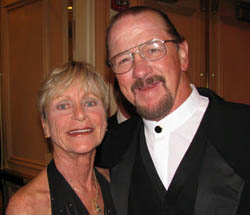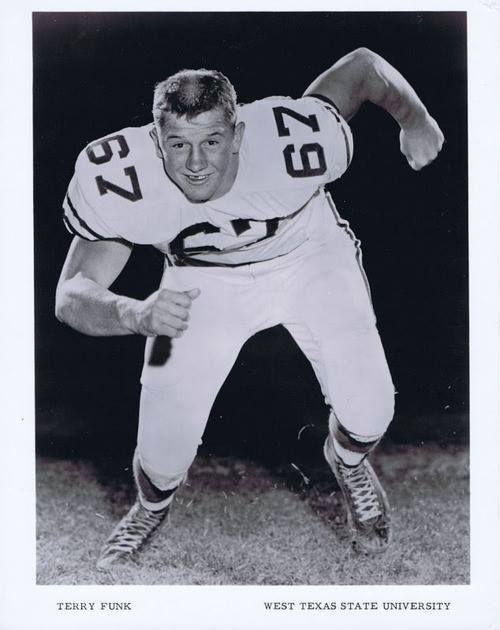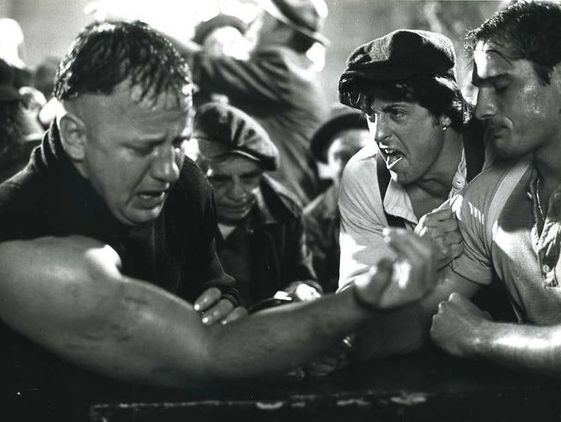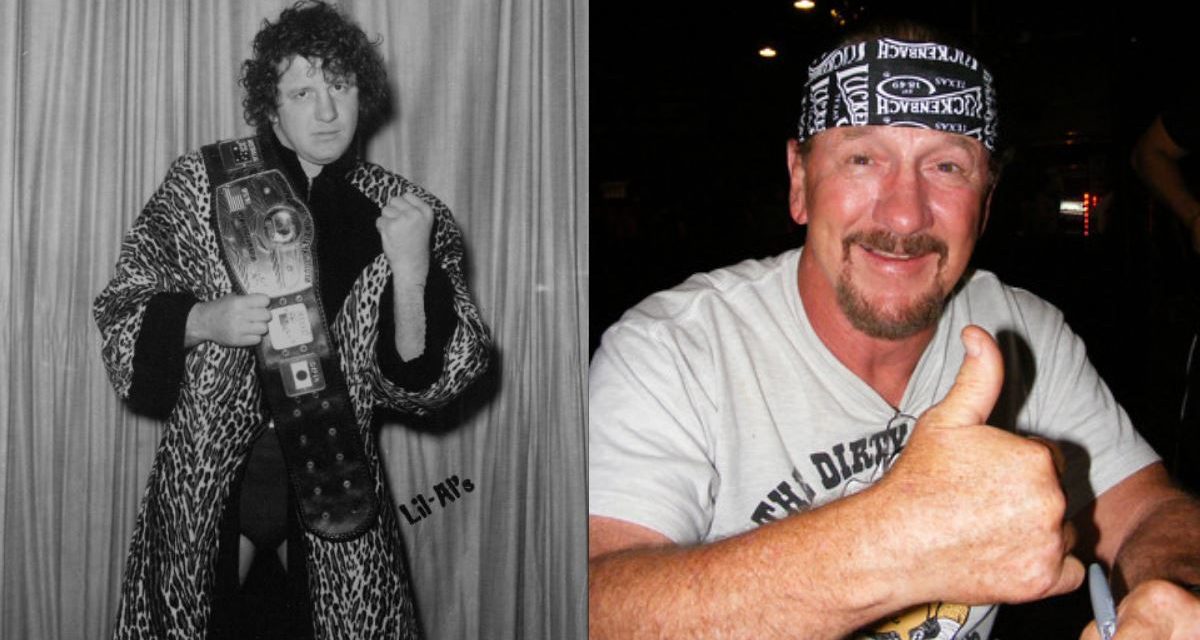Few things in life gave Terry Funk more pleasure than riling up a crowd. At his induction into the Pro Wrestling Hall of Fame in May 2004, he bragged about one near-riot on August 30, 1971. Funk was wrestling at New York City’s famed Madison Square Garden, alongside his father, Dory Funk Sr. The two Texans were battling the Kangaroos, Al Costello and Don Kent, in a bout that went 45 minutes to a curfew draw without any falls. The crowd was real tense and about to snap as the show was coming to a heated conclusion. “Who actually came down, I don’t know if you remember this at all or not, Vince [McMahon] Jr. came down there, and he said, ‘Daddy said to get out of the ring!’ And he was pretty young at the time, and I said, ‘Get your ass out of here!'” Funk told the audience. “I certainly wouldn’t say that to him today! I’d do anything but go ahead and argue with him or anything else if he gave me some of that money.”
Such is the duality of Terry Funk. At one moment, he can be serious, telling tales from the arena or road, of accidents or lost friends or mentors; the next, he can be sharing a joke in his unmistakable gnarled, squeaky voice. It’s the former World champion who dedicated his autobiography to all the enhancement talent. It’s that contradiction of the polite, soft-spoken man who apologizes for his need to spit out his chewing tobacco with the madman of the ring, who would stop at nothing to incite a crowd.
The legend of Terry Funk came to an end on Tuesday, August 23, 2023, passing away at age 79.
Mick Foley confirmed the news: “I’m struggling to process this — but Terry Funk is gone. I just talked to Terry’s daughter, Brandee, who gave me the awful news. He was my mentor, my idol, and one of my closest friends. He was the greatest wrestler I ever saw.”
In July 2021, Funk was moved to residential care for “his multiple health issues, which do affect his mind as well as the rest of his body. As you can imagine, some days are better than others. He & his family appreciate all of your kind words!” as his official Twitter feed, @TheDirtyFunker, reported.
Much changed for Funk after the passing of his wife, Vicki Ann Funk, on Friday, March 29, 2019. She was 75. As her obituary read, “According to Terry, Vicki was the ‘ramrod’ of the Funk family” and “a devoted wife, mother, and grandmother.”

Vicki and Terry Funk in 2009.
But what is the legacy of Terry Funk?
Where does he rank all-time?
He was a hero at home in Amarillo, Tex., where he was the son of the promoter, who was also heavily involved in charity in the community. But in Memphis, say, he was public enemy number one for a while for his attempts to eradicate any connection between Jerry Lawler‘s head and his torso. He was NWA World champion from December 1975 to February 1977, but his older brother, Dory Jr., beat him to the pinnacle, holding the same title from 1969 to 1973.
The comparisons between the brothers come frequent from their peers. “What a character he is. I worked with him sometimes, and I just used to shake my head,” said “Cowboy” Dan Kroffat. “This guy was somewhere between a space cadet and a nutcase. He was wild. His brother was nothing like him. When I worked with Dory Funk, those were two different matches completely, night and day.”
Bill Watts agreed. “Dory Funk Jr. was, I think, one of the greatest champions that we ever had, whereas I think Terry Funk turned the championship into kind of a cartoon.” A close friend of the Funk patriarch, Les Thornton, was even more direct on Terry’s reign. “That was the start of the goofy champions.”
Terry does have his defenders, though, with his brother and frequent tag team partner first in line. “I think that’s an exaggeration. Terry is far out. He does crazy things. He also learned from the same teacher that I did, that’s his father, Dory Funk Sr.,” said Dory Jr. “We both had to learn wrestling from the basics, starting with amateur wrestling, competitive amateur wrestling, and on into the pros. Few people know how really good a wrestler Terry is, because they like to talk about the wild and crazy things that he does. But he does have a solid wrestling background along with that.”
“Terry’s a little strange, and the quirky bit came right from dad,” said former AWA World champion Nick Bockwinkel. “He was a solid worker. He was every bit as good as Dory was. Dory was totally serious. Terry’s work was so good that it allowed him to be just a little bit whimsical. In other words, if he got nailed real good, he might stagger back like a drunk versus an athlete getting knocked down.”
Manny Fernandez, a protégé of Terry Funk, dismisses the goofy talk. “When Terry was world champion, there was no such thing as a goofy champion. Terry was very serious as the world champion, very, very serious. There was no goofing around. His style everybody thinks is goofy. That’s fine, I don’t think it is. Terry’s style is what Terry makes it for the situation, like a chameleon. Whatever was required of him to get that thing over and done, that’s what Terry did,” Fernandez said. “With Funk, it was crazy, up and down, goofy things outside the ring, around the ring, to entertain the people.”
Born June 30, 1944 with his father away in the U.S. Navy, Terry Funk would grow up around wrestling. His father’s garage in Amarillo was a sparring ground, where contemporaries like Bob Geigel and Verne Gagne would mess around with Dory Sr., and Kal Farley’s Boys Ranch, which his father ran, had Terry on the mat by the age of four. “All those other kids, they went ahead and thought about being cowboys, being indians, and playing with their cap guns. Not me. I thought about a lot of other things. I thought about wrestling, back drops, and all that kind of stuff, one tackle and get it again and that kind of crap,” Funk said.
During summers, the family would travel with Dory Sr. on the circuit, with memories of Northern Ontario still vivid in his mind. “It was a great place to go. They popped it, with he and the Vachons. Gosh, it was just a little territory, but they were drawing, selling out North Bay every week. It was unbelievable,” said Terry. “They’d have him against the Mad Dog. They’d had a riot every week and have to fight their way out of the arena. They’d play ‘God Save the Queen.’ … It stopped them for a couple of weeks, then it didn’t work.”

Terry Funk at West Texas State.
He would attend West Texas State, where he was a tight end on the football team, but it wasn’t a surprise when the 6-foot-1, 235-pound Terry followed his father and older brother into wrestling. From his debut in 1965, until present day, when he is known to still put on the tights on occasion, Funk entertained and enraged audiences.
“The riots were a form of flattery. The greatest thing (for a heel wrestler) is to do your job so well that someone wants to kill you. What could be more wonderful?” asked Funk. “People who have done terrible things to me and wanted me to charge them, well I wouldn’t. I mean do I want to put someone in jail because I convinced him or her that I needed to die? I did it to them. That’s how I look at it and that may be sick but it’s also beautiful.”
Strange as it may seem, he is nostalgic for the days when his life was in danger from the crowd, as opposed to the last decade, where he transformed into a hardcore wrestler that seemed intent on one more table spot or one more barbed wire match.
“I loved the era of the riots. In Puerto Rico there’d be riots where I’d have to fight my way to the back, San Antonio, the Dallas/South Houston area. It was absurd. They would have to stop the matches because too many people would be hitting the ring. In Kentucky I can remember when they took 40 guns off of people coming to the show. I’ve had guns pulled on me and knives too,” said “Terrible” Terry. “Corpus Christi is where I got stuck with a knife in the neck. Fortunately, it wasn’t that big a blade. It went all the way into the hilt and I thought it was a dart or something, so I left it in. When I got to the back and saw it was a knife my eyes got as big as saucers when I realized what it was and that someone had tried to kill me.”
As great — or crazy — as Terry might have been in the ring, he was equally memorable on the microphone. “Terry is one of the great storytellers,” said Jimmy Hart, dropping into a Funk impression, and telling the story about having an old dog that they had to take out behind the barn. “‘That old dog didn’t bite anybody any more.’ That left your imagination, ‘Oh my God, did he shoot the dog or what?’ ‘That’s what I’m going to do to you, Jerry Lawler. I’m going to take you out behind the barn and you’re not going to be the King.'” Or, as Memphis announcer Lance Russell said, “Terry Funk understood exactly the character that he was.”
In Miami in 1989, Bob Cook got a lesson on how far Funk would go to keep up his character. “He was sitting there on this forklift, telling me a story and laughing. Some security guard came over and said something to him about getting off the forklift. Terry just gave him a dirty look and cussed at him and didn’t get off,” said Cook. “Later, he’s out watching the matches by the curtain and a kid came over and asked for his autograph. And Terry cussed at him and told him to get away and I asked, ‘Terry, why were you mean to a little kid?’ He said, ‘Bob, if these people out here see me being nice to a little kid now, they’re not going to believe I’m a bad guy when I get in the ring.'”

Terry Funk and Sylvester Stallone in Paradise Alley.
Away from the ring, Terry used that interview style to land one of the lead roles in Paradise Alley. The press release for Funk’s character said that Terry “answered that [casting] call by sending a 2-1/2 minute videotape to writer-director-star Sylvester Stallone which was so brutal, so threatening and so utterly ridiculous that the part of Franky the Thumper was his, hands down.” Other film roles and stunt work would follow, but wrestling always called back when the agents didn’t. (Road House from 1989 deserves mention though.)
Having walked out of the WWF during its 1980s heyday, Funk reinvented himself as a hardcore icon, who was “middle-aged and crazy” and enjoyed stretcher matches and at least one no rope explosive barbed wire time bomb land mine double hell death match.
In 2005, he was honored by his colleagues for his contributions to the business with the Iron Mike Mazurki Award at the Cauliflower Alley Club reunion. Like Funk’s wrestling style, his speech had a little of everything: emotion, humor, self-reflection and insight. “This is a wonderful, wonderful gathering. It’s more than just a gathering, it’s a blood gathering. We all have the same blood, it’s for a crazy, excuse me, but, goddamn insane business,” he said to laughter and applause. “I love everybody, and I love everybody in this room. I truthfully love this business with all my heart. It’s just the greatest thing. It’s a trip I’ll never forget and never want to end.”
Terry Funk is survived by his daughters, Stacy Clenney and Brandee Dungan; three grandchildren, Daniel and Champe Clenney and Bella Dugan; and numerous extended family and friends.
— with files from Steve Johnson
RELATED LINKS
- Aug. 23, 2023: George Tahinos’ Terry Funk photo gallery
- Aug. 23, 2023: Friends, fans celebrate legacy of Terry Funk
- Funk Family story archive

